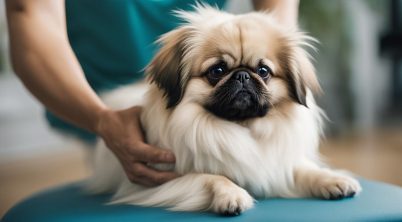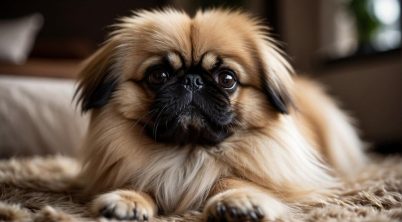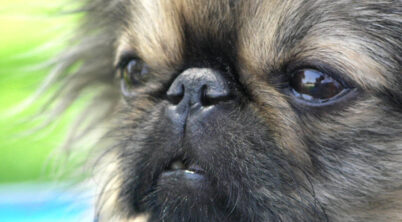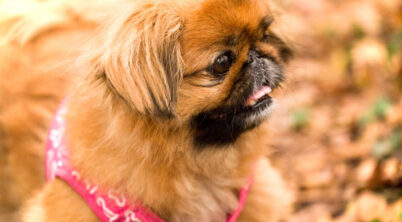Pekingese dogs may lick the air for several reasons, ranging from simple exploratory behaviors to indications of an underlying health issue. Air licking can be a sign of feeling anxious or stressed. In some cases, it could be an attempt to gather more information about their environment, as dogs use their sense of taste to explore the world just as much as they use their sense of smell and sight.
Health-related causes of air licking in Pekingese can include nausea or gastrointestinal discomfort. It might be a response to something they have ingested or an attempt to ease a bad taste in their mouth. More serious concerns, like a dental issue or neurological conditions, could also manifest as repetitive air licking, which highlights the importance of monitoring this behavior.
If a Pekingese is persistently licking the air without an apparent reason, it’s advisable for owners to observe their pet for other symptoms and consult a veterinarian to rule out health problems. A professional assessment ensures that the dog receives appropriate care and that any troublesome behaviors are addressed effectively for the well-being of the pet.
Table of Contents
Why Does My Pekingese Lick the Air?
When a Pekingese licks the air, this behavior may appear unusual to their owners. Several reasons could underpin this action, often indicative of the dog’s physical and emotional state.
Health-Related Causes: The Pekingese may lick the air due to nausea or gastrointestinal discomfort. If it occurs right before or after meals, it may be related to problems with digestion.
Behavioral Issues: Licking the air could be a repetitive behavior that signifies a compulsive disorder. Such behaviors often develop in response to stress or anxiety.
Environmental Triggers: A Pekingese might start licking the air in reaction to airborne particles that excite or irritate them, like dust or cooking scents.
Emotional Responses: Dogs may lick the air when they’re feeling happy or excited. Positive emotions can prompt behaviors that seem quirky, including air licking.
| Potential Cause | Consideration |
|---|---|
| Health-Related | Observe timing related to meals, check for signs of nausea. |
| Behavioral Problems | Note if licking is repetitive and lacks an apparent cause. |
| Environmental Triggers | Assess recent changes or ongoing events in the environment. |
| Emotional State | Correlate licking with signs of happiness or excitement. |
If a Pekingese frequently licks the air and is accompanied by other concerning signs, such as changes in appetite or behavior, consulting a veterinarian can rule out underlying health issues. Monitoring the dog’s environment for potential stressors and maintaining a calm setting can also help address this behavior.
Common Factors Influencing Air Licking
Pekingese dogs may lick the air for various reasons, ranging from health-related concerns to behavioral and environmental triggers. Understanding the underlying causes will help Pekingese owners identify when it’s a benign behavior and when it’s a sign that requires a veterinarian’s attention.
Health-Related Causes
Gastrointestinal Problems: Conditions such as acid reflux, gastritis, or an upset stomach often result in air licking. If a Pekingese is licking the air and displaying signs of abdominal pain or vomiting, it could indicate a gastrointestinal disorder, necessitating a visit to the vet.
- Symptoms of concern include:
- Vomiting or diarrhea
- Lethargy
- Loss of appetite
Neurological Conditions: Seizures or cognitive issues may also manifest in repetitive actions such as air licking. Any accompanying behavioral changes, such as disorientation, could suggest a neurological condition.
Dental Problems: Pain stemming from dental issues can cause a dog to lick at the air. Visible dental problems should prompt an appointment with a veterinarian.
Behavioral and Environmental Triggers
Stress and Anxiety: A Pekingese may lick the air due to stress, anxiety, or fear. Changes in the home environment like moving house, introducing a new pet, or separation can trigger such behavior.
Boredom: A lack of exercise or insufficient interaction may lead to boredom, prompting behaviors like air licking out of a need for stimulation.
- Behavioral cues include:
- Excessive scratching or itching
- Pacing or restlessness
Training and Adjustment: Pekingese require consistent training and a stable environment. Any shift in routine can result in stress or anxiety, leading to behavioral expressions such as air licking.
Diet and Nutrition Impacts
Allergic Reactions: Food allergies or reactions to specific diet changes can lead to an upset stomach, nausea or itchy skin, which may result in a Pekingese licking at the air.
Ingestion of Foreign Body: If a Pekingese consumes something inedible, it could lead to discomfort or a foreign body obstruction in the gastrointestinal tract, causing them to lick at the air.
Regular monitoring of diet and prompt veterinary care when a problem is suspected are crucial to addressing these issues.
The Pekingese Breed Specific Sensitivities
The Pekingese, a toy breed with a regal history, may exhibit the peculiar behavior of air licking due to several breed-specific sensitivities. These dogs require special attention in various aspects including dietary needs, dental care, and managing allergies, which could provoke such behavior.
Diet: Pekingese have specific dietary needs that, if not met, could lead to gastrointestinal issues or dietary allergies. Their diet must be rich in nutrients and appropriate for their size to prevent deficiencies that could manifest in behaviors like air licking.
Teeth: It’s crucial for owners to maintain the dental hygiene of their Pekingese. They are prone to dental issues due to their small mouths, which can lead to discomfort and air licking. Regular veterinary dental check-ups and proper oral care are important.
Allergies and Parasites: Sensitivities to environmental factors like pollen or to parasites can lead to skin irritation and discomfort. Pekingese with allergies may lick the air as a response to the sensation of itching or tingling they cannot reach.
Exercise: Though their exercise needs are low, adequate physical activity is important for a Pekingese’s overall health, which in turn can affect their behavior.
Sense of Smell and Vomeronasal Organ: As dogs with a keen sense of smell, Pekingese use their vomeronasal organ to process scents. Air licking sometimes can be a sign they are detecting scents or pheromones, interpreting and reacting to their environment.
Owners should consult a veterinarian for an accurate diagnosis and tailor the care for their Pekingese with these sensitivities in mind. Proper knowledge and intervention can help manage any issues that could cause a Pekingese to lick the air.
How Pet Owners Can Address Air Licking
When a Pekingese starts to lick the air habitually, pet owners should consider both environmental adjustments and seeking professional advice to ensure their pet’s health and well-being.
Home Care and Prevention
- Environmental Enrichment: Enhance their environment with interactive toys and plenty of exercise opportunities to stimulate their mind and discourage boredom-related air licking. An appropriate supply of toys can keep them engaged, reducing the chance of developing compulsive disorders.
- Diet Evaluation: A balanced diet, perhaps with the help of a veterinarian’s recommendation, might prevent gastrointestinal issues which can lead to air licking. Monitoring treats and main meals for any adverse effects helps maintain a healthy digestive system.
- Routine and Affection: Establishing a predictable routine and providing consistent affection helps combat anxiety that may trigger air licking. Regular playtimes and affectionate interactions reinforce the sense of security.
Professional Assistance and Training
- Veterinarian Consultation: Continuous air licking requires a veterinarian’s evaluation as it may indicate health problems. A thorough check-up can rule out or treat any underlying conditions.
- Behavioral Experts: For persistent cases not linked to health, a trainer or an animal behaviorist can identify the root of the behavioral problem. They can offer specific strategies and training programs to modify the air-licking behavior.
Pet owners can adopt a proactive approach by incorporating preventive measures at home while also being prepared to consult professionals for persistent issues.
The Role of Regular Veterinary Check-Ups
When investigating why a Pekingese may be licking the air, regular veterinary check-ups play a critical role in identifying any underlying medical condition that might be causing this behavior. Veterinarians are equipped to assess a dog’s overall health, including gastrointestinal and dental conditions which could lead to excessive licking.
Dental Care: During check-ups, a vet examines the Pekingese’s teeth for signs of dental issues. Problems such as periodontal disease or tooth abscesses might cause discomfort, prompting a dog to lick the air.
Gastrointestinal Disorders: Veterinarians also consider the possibility of gastrointestinal disorders. Licking the air can be a sign of nausea or an attempt to alleviate the discomfort from gastrointestinal upset.
- Diagnostic Tools: Veterinarians may utilize various tests to diagnose medical conditions. These can include:
- Bloodwork
- X-rays
- Ultrasounds
Medication: If a medical condition is identified, the vet might prescribe medication to address the issue. This treatment can alleviate symptoms, thereby reducing the air licking behavior.
Veterinary experts advise against self-diagnosing pets or delaying professional consultations, as early detection and treatment are fundamental to managing health issues effectively and preventing them from becoming severe. Regular check-ups can not only give owners peace of mind but are also vital to the health and well-being of their Pekingese.
Behavioral Patterns and Their Meanings
When observing a Pekingese licking the air, one might wonder about the underlying causes of such behavior. Air licking in dogs can be a sign of various conditions, ranging from the benign to more serious behavioral issues.
- Stress and Anxiety: A Pekingese may lick the air as a self-soothing gesture when experiencing stress or anxiety. This action can be compared to a nervous habit in humans, such as tapping a foot or biting nails.
- Seeking Pheromones: Dogs have a highly developed sense of smell and may lick the air to detect pheromones, which are chemical signals that can convey a vast array of information about other dogs or their environment.
- Gastrointestinal Issues: If a Pekingese engages in frequent air licking, it could indicate an underlying gastrointestinal problem. Owners should observe if the behavior is accompanied by other symptoms, such as vomiting or a decreased appetite, and consult a veterinarian.
- Compulsive Disorder: Air licking in dogs may develop into a compulsive behavior, especially if it is performed excessively or disrupts daily activities. This could signal a behavioral disorder that might require professional intervention.
It’s essential to carefully monitor the context and frequency of air licking. For instance, if a Pekingese starts licking the air after encountering a new dog, it’s likely a response to pheromones. However, if the behavior appears suddenly and is persistent, it could be indicative of stress or a medical condition. Consulting with a professional can help to determine if the observed licking is benign or a sign of a more significant behavioral problem.
Potential Emergencies: Recognizing Serious Symptoms
When a Pekingese licks the air excessively, it may appear innocuous, but it can sometimes signal a significant health emergency. Owners should be alert to accompanying symptoms that could indicate an urgent need for veterinary care.
Vomiting: If air licking is followed by vomiting, it may suggest gastrointestinal upset. Continuous or severe vomiting is a red flag, especially if there is blood present.
Seizure Activity: Air licking could be a precursor to seizures. Observing the presence of convulsions, stiffness, or loss of consciousness requires immediate veterinary attention.
Abdominal Pain and Upset Stomach: A Pekingese displaying signs of pain such as whimpering or sensitivity when touched on the belly, combined with air licking, could be suffering from abdominal pain or a gastrointestinal disorder.
Lethargy: A sudden onset of lethargy along with air licking and other symptoms might indicate nausea or a more severe condition.
In the event these symptoms are observed, here’s what owners should look for and how to proceed:
- Foreign Objects: Check the mouth for any obstructions.
- Gastrointestinal Disorder: Be aware of symptoms like diarrhea or changes in appetite.
- Immediate Veterinary Care: If any of these signs are present, especially in combination, they should seek immediate veterinary consultation.
Recognizing these warning signs enables prompt action, possibly preventing the escalation of an emergency medical situation.








